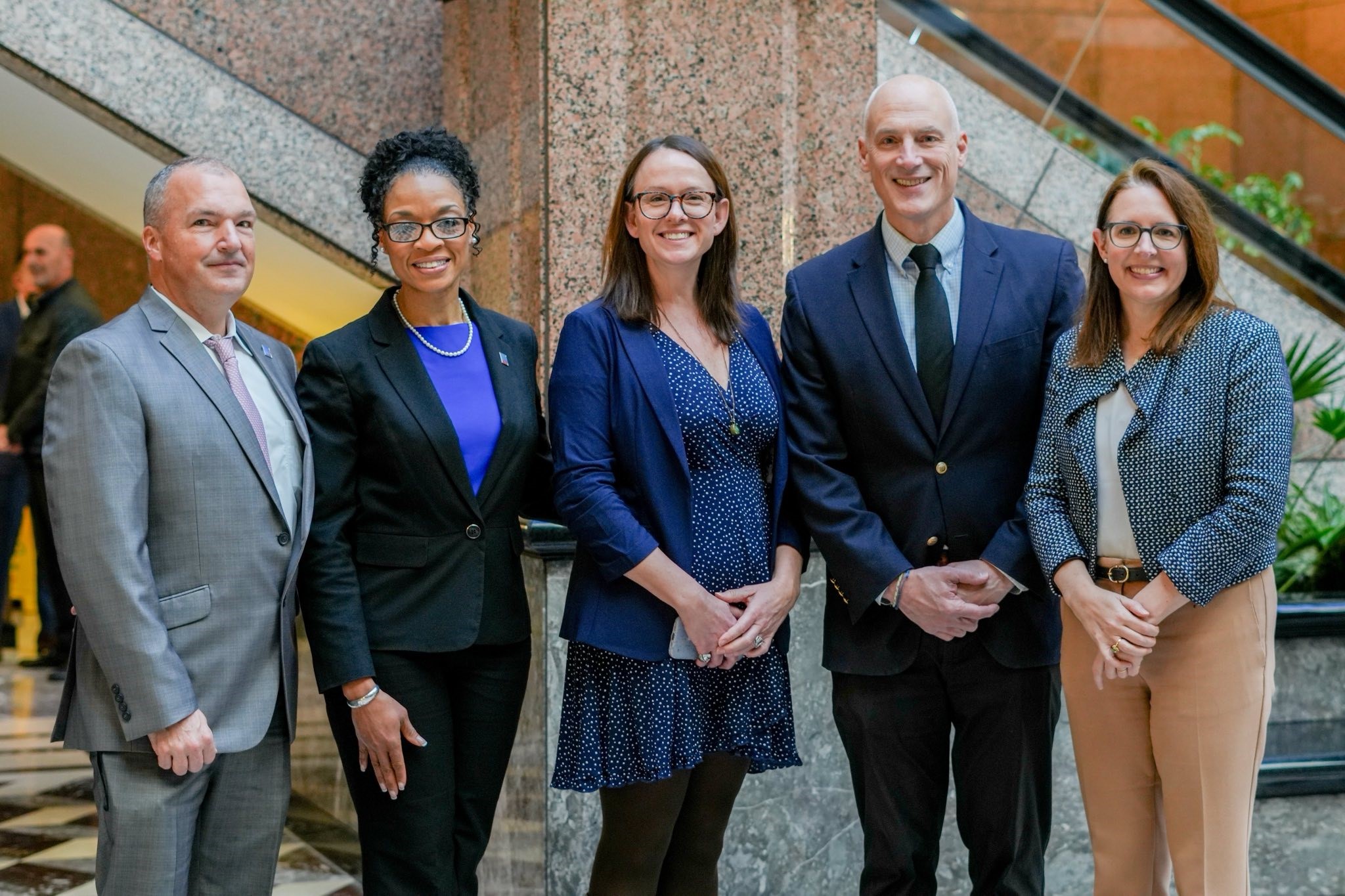
West Hartford Delegation, Education Leaders Welcome Immediate State Funding for Special Education

From left to right: West Hartford Superintendent Paul Vicinus Jr., Board of Education Chair Dr. Lorna Thomas-Farquharson, State Rep. Jillian Gilchrest, State Sen. Derek Slap, State Rep. Kate Farrar
Today, State Senator Derek Slap, State Representatives Jillian Gilchrest, Tammy Exum, Kate Farrar, Bobby Gibson and James Sanchez, along with West Hartford Superintendent Paul Vicinus Jr. and Board of Education Chair Dr. Lorna Thomas-Farquharson welcomed the announcement of an immediate allocation of state funding for special education.
Early next week, the legislature will vote to approve an immediate $40 million injection of state funding to municipalities to support special education needs for the current fiscal year. This funding is in addition to the $181 million which was previously appropriated for Fiscal Year 2025 bringing the total to $221 million. The specific allocation for West Hartford schools will be announced at a later date.
The funding will be allocated through the Excess Cost Grant program and distributed to municipalities through a tiered reimbursement structure which prioritizes funding for the neediest cities and towns.
The House will convene on Monday, February 24 and the Senate on Tuesday, February 25.
“It is our constitutional and moral obligation to provide an education for all Connecticut students of every need level. This is a good downpayment on what must be a larger commitment to help towns and taxpayers cover the expenses of special education.” said Sen. Derek Slap. “Skyrocketing costs have outpaced the state’s increased payments and left local governments in an impossible situation. I am pleased with this immediate injection of funds for the current fiscal year. While there is more work to do, I hope this mid-year appropriation shows local taxpayers, parents and educators that we are listening.
“We heard loud and clear from our town leaders and families that special education funding is needed now,” said Rep. Jillian Gilchrest. “I am proud that the Legislature is prioritizing public education and taking action to ensure our students are supported.”
“This allocation of immediate funding for special education underscores the importance of this issue,” Rep. Tammy Exum said. “Students with disabilities shouldn’t be short-changed, and neither should teachers. This funding ensures both will have the support for the services they need to succeed.”
“Special education funding is critical to support our community so that every child receives the opportunities they deserve,” said Rep. Kate Farrar. “This additional funding for West Hartford is essential not only to support special education students but to reduce cuts to other educational needs in our town.”
“I am thrilled that West Hartford will receive a significant investment in special education,” said Rep. Bobby Gibson. “This funding will provide a great boost to services and programs that help our students succeed.”
“Investing in special education is an investment in every child’s right to reach their full potential,” said Rep. James Sánchez. “This funding ensures that students with diverse needs have the resources and support they deserve to thrive in school and beyond.”
“We are appreciative of the Legislature’s support of our educational mission, especially recognizing the unique needs of all children,” said West Hartford Superintendent Paul Vicinus Jr. and Board of Education Chair Dr. Lorna Thomas-Farquharson in a joint statement. “As a district, we are committed to providing equitable education to all of our students and greatly appreciate funding provided in support of special education. When it comes to helping our young people learn, we have to work together, for as it has been said ‘Little eyes watch what we do far more than little ears hear what we say’. This funding will support needed programming and help to significantly fill shortfalls for our most impacted learners. Thank you for responding to a need that serves our most precious in need, our children.”
Earlier this session, Senate Democrats unveiled Senate Bill 1, An Act Increasing Resources for Students, Schools, and Special Education, and the House Democrats introduced House Bill 5001, An Act Concerning the Quality and Delivery of Special Education Services in Connecticut. Both pieces of legislation aim to reform Connecticut’s special education to lower costs, strengthen services, and provide more financial support.
Connecticut has made consistent and deliberate strides to increase its support of education over the last several years. State budgets adopted by the General Assembly have boosted funding for education by a total of $364 million since fiscal year 2023. The legislature supplemented this support with an additional $150 million dedicated to Education Cost Sharing Grants.
One of the ways in which Connecticut provides financial assistance to towns and cities for special education services is through the Excess Cost Grant program. This program is designed to offset significant expenses associated with educating certain students with special needs.
In 2022, the legislature amended the Excess Cost Grant program to create a tiered reimbursement structure to ensure that the state’s poorest municipalities were given funding priority. Meanwhile, state budgets have increased funding for the grants by $50 million over the last two fiscal years.
However, these efforts have not been enough to keep pace with significant increases in the need for additional special education funding experienced by Connecticut towns and cities. From fiscal year 2022 to fiscal year 2023, the estimated cost of fully funding the Excess Cost Sharing Grant program surged from $175.7 million to $203.8 million. That number climbed to $260 million in fiscal year 2024 and is estimated to be $289.3 million in 2025.
Contact: Garnet McLaughlin
860-304-2319









